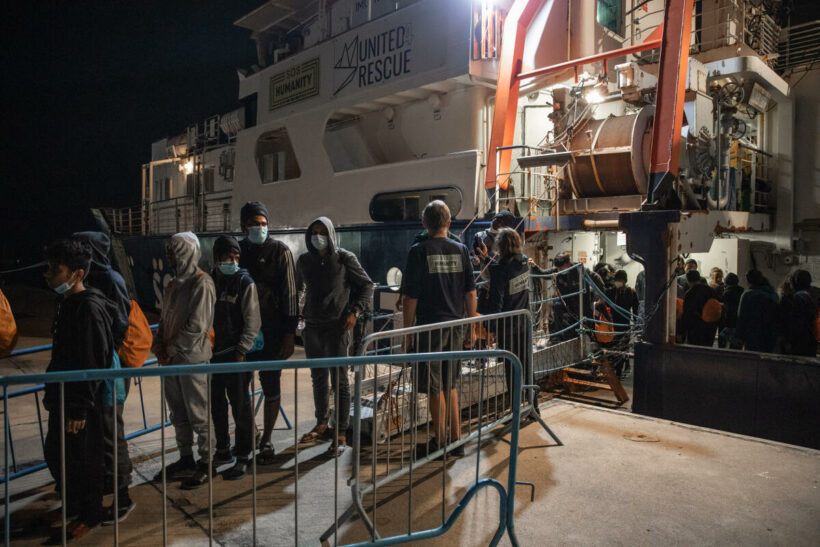On Monday, 6 February 2023, the court of Catania, Sicily, decided that the issuance of an Italian inter-ministerial decree that imposed a ban on the rescue ship Humanity 1 on November 4, 2022, from stopping in Italian territorial waters was unlawful conduct. It discriminatorily hindered the right to rescue and access to the asylum procedure.
As a result, only a selection of the 179 survivors whom the search and rescue organisation SOS Humanity had rescued from distress at sea were allowed to disembark in the port of Catania. The court’s decision is also significant for the subsequent decree-law issued on 2 January 2023, voted upon in the Italian Parliament on Wednesday, since the judge highlighted Italy’s duty to assist people in distress at sea. Italy is currently violating this very obligation by the newly imposed restrictions against non-governmental search and rescue organisations.
In November 2022, SOS Humanity, together with Italian lawyers, supported the 35 remaining survivors who were originally not permitted to disembark Humanity 1 by initiating fast-track legal proceedings at the civil court in Catania. The goal was to ensure that their right as protection seekers to access a formal asylum procedure on land would be guaranteed as a matter of urgency. Before the court could come to a decision, the survivors on Humanity 1 were finally allowed to disembark on 8 November 2022. This change of policy came after widespread media coverage of the selection of protection seekers on board, local protests and the announcement of a hunger strike by the 35 survivors followed by a psychological assessment.
“This ruling by an Italian court emphasises that the new Italian government is obliged to follow international law,” says Mirka Schaefer, Advocacy Officer of SOS Humanity. “The rights of refugees who seek international protection cannot be undermined by depriving some of them of their right to apply for asylum in an EU member state. The judge highlights Italy’s obligation to provide assistance to every shipwrecked person, which the Italian government failed to do in November 2022. In addition, Italy is violating this duty with the new decree-law issued on 2 January 2023 that restricts non-governmental search and rescue. This new decree contradicts international maritime law, human rights and European law and will lead to more deaths in the Mediterranean. We call on Italian Members of Parliament to vote against this unlawful decree on Wednesday and prevent its conversion into national law.”
In autumn 2022, SOS Humanity also took legal action against the inter-ministerial decree of November before the Regional Tribunal in Rome. A decision by this court is still pending.
The aforementioned ruling of the court of Catania is available here as a PDF (in Italian only).
Background: events in November 2022 related to the inter-ministerial decree:
While still at sea and having waited for 13 days for a place of safety for the 179 survivors on board, the captain of the Humanity 1 received a letter on the evening of 4 November. It was signed by the Italian Ministers of the Interior, Matteo Piantedosi, of Defence, Guido Crosetti and of Infrastructure & Mobility, Matteo Salvini. This decree prohibited the Humanity 1 from remaining in Italian territorial waters for longer than “necessary to ensure rescue and assistance operations for people in emergency conditions and in precarious health conditions.” The decree indicated that – instead of a disembarkation of all those rescued according to the law of the sea – particularly vulnerable people would be identified by authorities and only this selection of survivors would be allowed to disembark from the vessel.
A day later, the port of Catania was assigned to Humanity 1. After a selection on board the Humanity 1 in the harbour throughout the night of 5 November until early in the morning of 6 November, whereby 36 adult males assessed as “healthy” were forced to remain on the ship, SOS Humanity took legal action. One man suffered a breakdown and had to be transferred to a hospital. The 35 remaining survivors on the deck of the ship started a hunger strike the following day.
Based on the inter-ministerial decree, the captain, Joachim Ebeling, was urged by Italian authorities to leave the port again with the 35 survivors on board, which he refused citing maritime law: “It is my duty to complete the rescue of people in distress by disembarking all survivors in Catania as a port of safety. I cannot leave the port until all survivors rescued from distress at sea have disembarked.”










